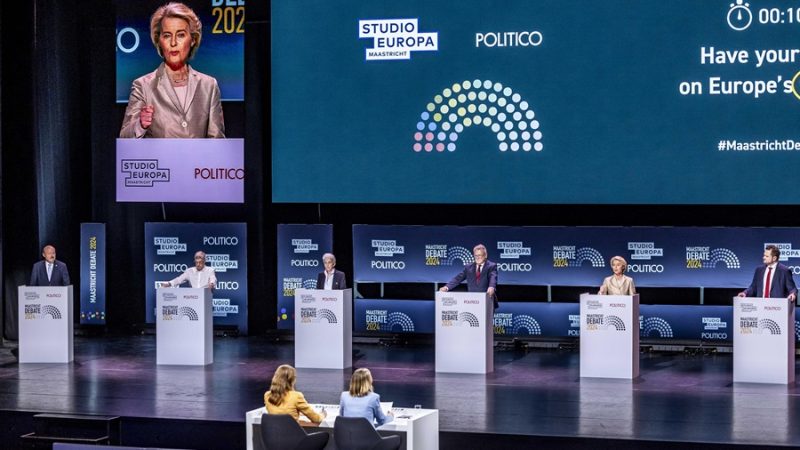Brussels – The European far-right party Identity and Democracy (ID) will not be represented in the debate in the European Parliament ahead of the elections on June 9 because the European Broadcasting Union (EBU), the organizer of the event, considers that they have not officially designated a lead candidate or main candidate for these elections.
The European Parliament announced this Tuesday the names of the participants in this debate, which will be held next Thursday 23 in the plenary hall of the European Parliament and will include German Ursula von der Leyen (European People’s Party), Luxembourg’s Nicolas Schmit (Party of European Socialists), Italian Sandro Gozi (Renew Europe), German Terry Reintke (Greens) and Austrian Walter Baier (European Left).
This list for the so-called “Eurovision Debate” excludes ID representative Andreas Vistisen, who did participate in the debate organized by the European information media Politico along with the University of Maastricht (Netherlands) last April 29.
Also, no one from the ultraconservative group, ECR, is listed, although they had already opted not to send any representatives to the debate in Maastricht.
The EBU argues that Vistisen is not selectable to participate in the debate because he has not been officially designated by ID to be their lead candidate or main candidate for these elections because, “as it was in 2014 and 2019, the Eurovision Debate is a forum for the main candidates for the position of President of the European Commission”.
“The invitations that were sent to the parties of the seven political groups of the European Parliament made this clear. Five parties responded and have nominated a main candidate. Two parties, ECR and ID, declined to nominate a main candidate and therefore have become themselves unselectable for this specific debate,” explained a spokesperson for the EBU to EFE.
The lead candidate system for the European elections provides that the candidate to preside over the European Commission, nominated by the European heads of State and Government, comes from the list of names proposed by the European parties before the electoral campaign, to strengthen the legitimacy of the post and that the voters have seen that person in debates and campaign events.
The system, which is not binding, worked in 2014, when Luxembourg’s Jean-Claude Juncker was nominated as President of the European Commission, having been a candidate of the European People’s Party (EPP); in 2019, however, the heads of State and Government ignored the names proposed by the parties and put forward the German Von der Leyen, who had not campaigned and was a relative unknown in Brussels.
This year, Von der Leyen is indeed the EPP candidate but this neither guarantees the nomination nor ensures that, if she is ultimately elected, it is because this system has been respected.
Both ECR and ID are against this concept because they believe that, if it becomes binding, it would allow the European Parliament to exceed the powers granted to it by the treaties in the process of selecting the President of the European Commission.
In his X account, Vistisen criticized the decision as “hitting a new low in terms of democratic standards” and warned that it excludes a quarter of the European electorate, a figure that polls attribute to ultraconservative and far-right options in the upcoming European Parliament elections.
This is the second controversy in just a few days for the EBU in Brussels, after its ban on European Union flags at the Eurovision festival last Saturday for considering them political symbols caused unease in the European Commission.
The Vice-President of the European Commission Margaritis Schinas has called for explanations and responsibilities from the organizers of the festival and has insisted that they must arrive before the debate next Thursday. (May 14)
 go to the original language article
go to the original language article
